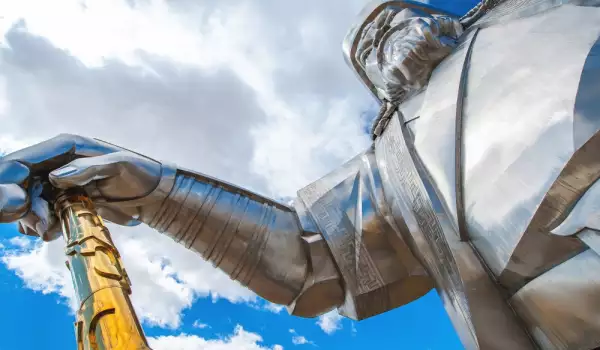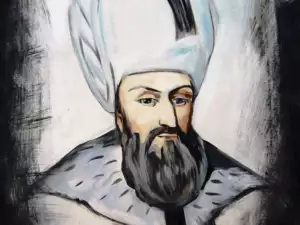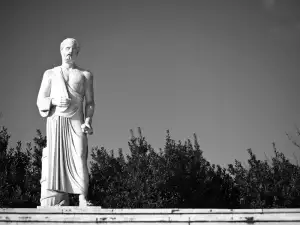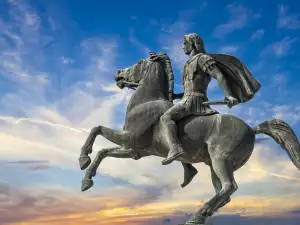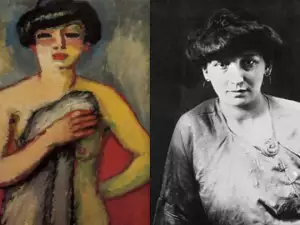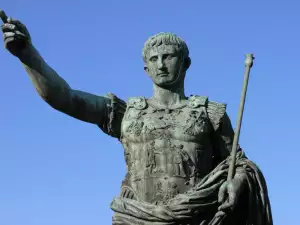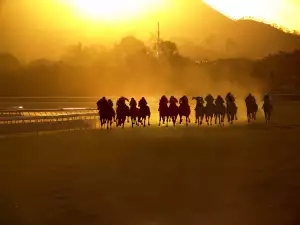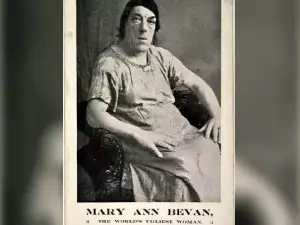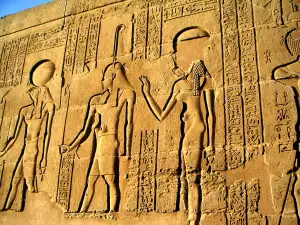There is hardly a person who has not heard his name and there is a reason why Temujin was born in 1162 and his name means Blacksmith. Born with a clot on his fist, which is a sign of leadership, blue eyes, a lot of strength and leadership skills.
In 1206, he accepted the nickname Genghis Khan given to him by the other chiefs. The title means universal master. But, let's see how he earned it.
His childhood does not begin like that of any normal boy. Only at the age of 9 he was sent to a family whose daughter he was to marry after 3 years. However, then news reaches him that his father has been poisoned and Timujin returns home to take care of his family. His tribe refused to obey a little boy and because of this Genghis Khan and his relatives were excommunicated from him. In the following years, they lead a nomadic lifestyle - they hunt, eat the gifts of the forests and sleep wherever they can. Once, during an argument, Timujin kills one of his half-brothers, but he never regrets his act.
The years did not pass lightly for the boy, as in 1182 he was captured by another tribe, but fortunately managed to escape.
Growing up, Genghis Khan had the opportunity to observe the political and economic development of Mongolia, including raids, thefts, corruption and intertribal conflicts. Thanks to his mother, he developed an ambition for the unification of nations.
When he was 16, Timudzhin married the intended girl named Boete. She is later kidnapped, but the brave young man frees her with the help of his allies. Subsequently, Genghis Khan had many wives, but recognized only his sons from Bote as his heirs and her as his only queen.
Timudjin entered the military circles after becoming close to his uncle - his father's brother and ruler of the Keraite tribe. The Mongols had many enemies, which forced Genghis Khan to unite his followers and supporters into a small organization. However, his principles differed radically from those inherent in the Mongol rulers. He promises soldiers and citizens wealth and glory from the victories achieved. It gives rights and power based on merit, not family ties. When the tribes clash and his side wins, Timujin does not destroy the losers, but takes them under his wing, turning them into his people. His idea is also the adoption of orphans from foreign tribes, for which his mother takes care. This way he increases his family, his powers and his supremacy. The new rules he introduced won the respect of enemies and allies alike.
Because of Timujin's growing power, many betray and abandon him. So does his uncle, whose son disapproves of his rule and forces his father to withdraw his cooperation. Numerous clashes with various enemy tribes followed, from which Genghis Khan always managed to escape.
After a series of victories, Timudjin became the sole ruler of Mongolia. He ruled wisely and purposefully. He introduced taxes that provided for the support of orphans, widows and poor people.
At the same time Genghis Khan was known for his cruelty. However, he also possessed the ability to learn and learned from his enemies. From the Chinese he learned the art of siege, from other tribes - the letter. He knew how to take the best and use it in the most effective way.
The Mongols were also excellent horsemen, which gave them a significant advantage in battle. Archers also occupied an honorable place in the army. Each soldier had 60 arrows, which he could shoot at a distance of 270 meters. The army also had other weapons, which they worked with perfectly - shields, sabers, axes, daggers.
1206 is a key year in Timudin's life. At that time he managed to unite Tatars, Mongols, Uighurs, Naimans, Merkits, Keraites, as well as several other smaller tribes. They declared him their Genghis Khan, a title he received posthumously and which his son Ugedei Khan subsequently assumed.
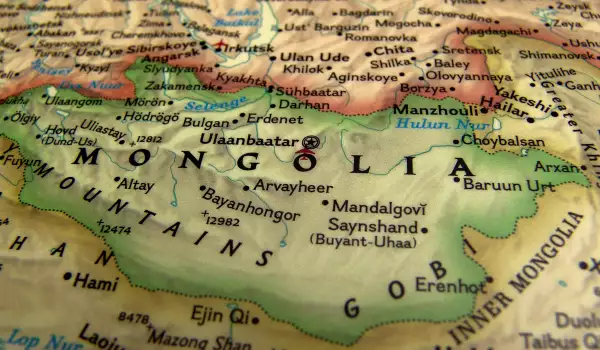
Temujin became the ruler who united all the warring tribes and the founder of the Mongol Empire – the most powerful and large state that ever existed in the history of the world. He became a national hero and was nicknamed the father of the Mongolian nation. At the time he unified the state, its population numbered about 200, 000, with an army of approximately 70, 000 soldiers.
To get a real idea - during the time of Genghis Khan, the Mongol Empire extended over the territory of large parts of today's China, Mongolia, Russia, Korea, Azerbaijan, Armenia, Georgia, Syria, Turkey, Iraq, Iran, Kazakhstan, Kyrgyzstan, Uzbekistan, Tajikistan, Afghanistan, Turkmenistan, Pakistan, Palestine and Kuwait.
As a huge power, the Mongol Empire has many enemies. One of them is the Tatars. Because of his battles with them, Temujin gained fame but of a merciless enemy and a loyal friend.
The khan cared very much for his army. He personally selected the commanders of the military units, assigned them, defined their functions and ensured that the soldiers received the necessary training to continue to maintain the strength of the Mongol army.
Epic is the Khan's battle with the ruler of the Khorezm Empire, which was located on the territory of Persia and Afghanistan. For four years Genghis Khan was preparing for the attack against it. The sultan of the empire outnumbered him in army, but not in cunning, as he did not deploy his soldiers properly. Temujin was an excellent strategist and captured one city after another. He made the Sultan flee, ceasing to pursue him, after throwing himself from a cliff into the Indus River.
In addition to his great achievements, Genghis Khan is also known for introducing a new type of government. He added new decrees and laws created by himself, collected in a collection bearing the name The Great Yassa.
Genghis Khan died on August 18, 1227 in the war with Western Xia. The exact cause of his death is unknown. His loss could also be due to old age. Of course, there are hypotheses according to which he was killed by his enemies. The location of his grave is also unknown, as all who participated in the burial were killed in order not to betray him.
The Mongol Empire was divided between the four sons of Genghis Khan - Juchi, Chagatai, Tolui and Ugedei. This also happens with his army, which is also distributed among his heirs.
The Khan leaves behind about 40 million corpses, which he kills in battles and wars along his path. According to statistics, the attacks of the Mongols reduced the world population by 11%.
10 golden rules of Genghis Khan
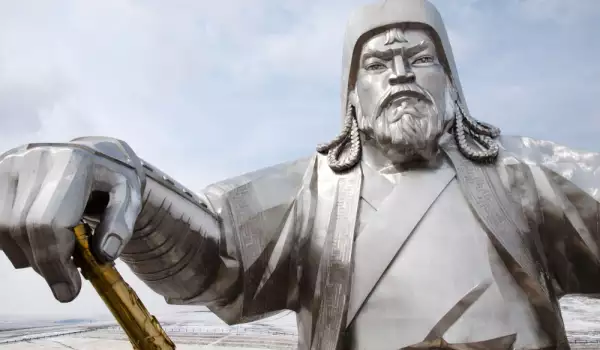
• Do not say bad words to your inseparable friend, which are not forgotten;
• Do not sleep on good deeds;
• To a person you should never trust, do not tell anything confidential;
• Do not succumb to the influence of bad people;
• Don't take women's words too seriously;
• Do not persuade your son with the help of your slave;
• Do not violate the accepted by many people;
• Do not consult with a treacherous (envious) person;
• Do not get addicted to sinful and disapproved actions by other people;
• Do not forget the true words of your best friend, until your death.
Genghis Khan's timeless quotes
1. It is not enough that I have won. All others must lose;
2. Better to be last among wolves than first among jackals;
3. Conquering the world on horseback is easy. Ruiling after that is the hard part;
4. There is nothing better than a person who does not drink. But where do we find such a person?
5. An army of donkeys led by a lion is better than an army of lions led by a donkey;
6. If you're afraid - don't do it, - if you're doing it - don't be afraid!
7. I wear the same clothes and eat the same food as the cattlemen and horsemen;
8. If someone tries to overshadow you, let them shine;
9. One of the pleasures of traveling is visiting new cities and meeting new people;
10. A person can get drunk up to three times a month. If they get drunk only twice, it is commendable;
11. Let my body die, but do not let my country die.
